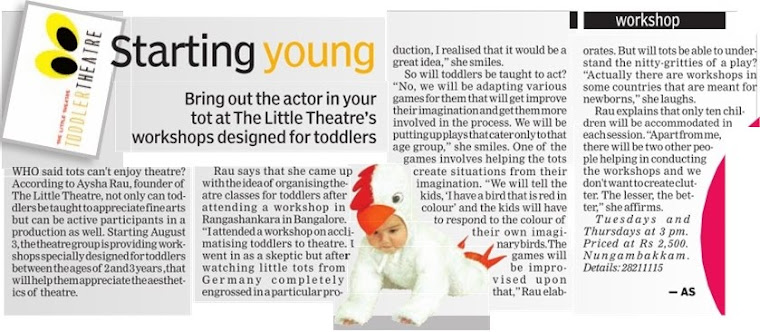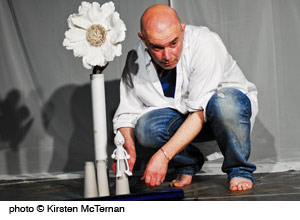Gathering in small numbers, the audience enters a mysterious, sculptural box. Inside, they go on a multi-sensory trip, through fabric, wool and towelling, making fresh discoveries in hidden compartments, calling the shots in a performance that is never the same twice.
It's the sort of thing the fashionable theatre group Punchdrunk might get up to in a secret London warehouse, with one big difference: the audience for this show, The Gift, starts at 18 months old. If you're three, you're past it.
Symon Macintyre, of the Edinburgh-based Puppet Lab, is one of a number of artists who, over the past decade, have turned their attentions to an audience still in nappies. With companies such as London's Oily Cart leading the way ("Baby Balloon roams into experimental-theatre territory that owes more to live art than to the West End," Guardian theatre critic Lyn Gardner wrote in January), they are in an altogether different league from the clowns, magicians and party entertainers who have traditionally cornered the preschool market.
"It's my pet hate when people ask if I do children's parties," says Patrick Lynch, an Oily Cart graduate whose Lyngo theatre produces Egg and Spoon, "a multi-sensory interactive experience" for the under-threes, and Circus Minimus, for "toddling clowns" aged two to four. "Do they think we've just been playing pin the tail on the donkey? No, we give them a high-quality, other-worldly experience, something that they wouldn't get with balloon-folding by Mr Smiley. Our director, Marcello Chiarenza, is a Jungian and works on a deep, symbolic level. A student of Jung would say that the images we're presenting to people in Egg and Spoon resonate with the collective unconscious."
Is there any point in performing to children who are still mastering the art of sitting up, let alone walking and talking? Isn't it vain to imagine that babies need any more stimulation than they already get from real life? Jo Evans reckons not. She's the producer of Oogly Boogly, a 45-minute "event for babies and their grown-ups", created by the National Theatre's Tom Morris and Improbable collaborator Guy Dartnell. Taking place in an inflatable tent, it's an improvised performance in which four actors imitate the movements and noises of the eight-strong audience. "It's about putting the child in the driving seat, giving them control of the environment," Evans says. "In essence, the children are choreographing the show. Their movements are the artistic centrepiece. It's a unique experience that the child [would otherwise] never come across in their whole time growing up."
This is a sentiment echoed by Andy Manley, whose My House, pitched at the 2-3 age group, will be performed in Edinburgh in May. "There is a completely different energy and focus with performance, compared with playing," he says. "A parent playing with their child might be looking to see if the beans are burning. But when you're performing, you have a level of focus which they've never seen in an adult. The story in My House is slight, but the emotions are big: finding a friend, being rejected, being scared, discovering things. It reaffirms what they're going through emotionally."
None of this is any odder than pregnant women playing music to their bellies - but there is a lurking suspicion that theatre is an extravagance for those so young. As adults, we go to the theatre expecting to be entertained. Children, we feel, should go to be educated.
"I certainly hope when people bring their children they're not thinking, 'This will improve my little baby'," says Lynch. "There's no proof of that. We don't even begin to think about developing them. Poor things, they do so much anyway and they all get tested - let's have some fun."
Manley remembers working on a children's show he thought relied too heavily on language. When he asked if they needed to say so much, an actor replied: "Well, how do we develop their language skills?" "But we can't do everything," Manley says. "What we do in theatre is help people understand the world they live in, and that the emotions they feel are the same as we all feel. If that's what a child gets out of it, that's great."
What does distinguish pre-narrative work from adult theatre is that genre definitions tend to dissolve. Macintyre prefers to think of The Gift as a 20-minute art installation, albeit one that requires the presence of a puppeteer and actor, and imagines it taking up residency in libraries and galleries. Oogly Boogly is billed as a "game", while Belfast's Baby Rave event offers the chance to experiment with contemporary music in an ambient atmosphere ("the only drug is Calpol").
"Children learn and explore through touch," says Heather Fulton, creative artist with Starcatchers, a Scottish company specialising in early-years theatre. "Everything they hold will go in their mouth. So we've been using a lot of food in our work. Tomatoes have a big part."
Call it what you want, says Lynch, but early-years shows have to be led by the audience. "Try to tell a one-year-old to sit down and listen, and it's just not going to happen," he says. "In Egg and Spoon, we allow them to play and give them the freedom in such a way that when they're doing what they think they want, they're actually doing what we want."
The younger the audience gets, the more focused the shows have to be. Oogly Boogly's audience has a window of six months. If you're younger than a year or older than 18 months, you'll be either insufficiently mobile or too good at talking. "That age group has the most exciting thing in the world to do, which is to try walking," says Manley. "It's hard to sit them down when they want to do this thing. Oogly Boogly works specifically with that age group because of that."
Try to present the same group with a piece of slapstick, however, and they're more likely to be distressed than amused, having yet to see the funny side in falling down. Rearrange the furniture in the nursery's lunch room, as Starcatchers recently did, and you risk upsetting your audience. But show them a never-ending thread, as Manley does in My House, and they find it hilarious. "I suppose it's something to do with cause and effect, where something doesn't behave in the way they expect it to," he says, a tad bemused.
In the past five years, the number of companies specialising in baby theatre has multiplied. Macintyre reckons that audiences, like policemen, are getting younger, which suggests that demand is growing. Jo Belloli, an early-years theatre programmer who works for London's Polka and Unicorn theatres, has been advocating such work in England since seeing it in France, Belgium and Denmark in the early 1990s. "The more you see, the more you realise what can work," she says. "You wonder how you'd keep a one-year-old still for half an hour, but I've seen it happen on numerous occasions."















 Keeping the little ones entertained is not always easy - beyond taking them to the playground AGAIN! But there are a handful of wonderful theatre groups who create fabulous shows especially for small children, and Tall Stories are among the best. This summer and into September, they are touring with their wonderful live adaptation of 'Room on a Broom', the joyous children's book favrouite written by Julia Donaldson and illustrated by Axel Scheffler (of 'The Gruffalo' fame).
Keeping the little ones entertained is not always easy - beyond taking them to the playground AGAIN! But there are a handful of wonderful theatre groups who create fabulous shows especially for small children, and Tall Stories are among the best. This summer and into September, they are touring with their wonderful live adaptation of 'Room on a Broom', the joyous children's book favrouite written by Julia Donaldson and illustrated by Axel Scheffler (of 'The Gruffalo' fame). Babies and toddlers in Caernarfon will be the first audiences in Wales to experience a new theatre production created by two of Wales’ leading theatre-makers for young people, Sarah Argent and Kevin Lewis.
Babies and toddlers in Caernarfon will be the first audiences in Wales to experience a new theatre production created by two of Wales’ leading theatre-makers for young people, Sarah Argent and Kevin Lewis.



No comments:
Post a Comment